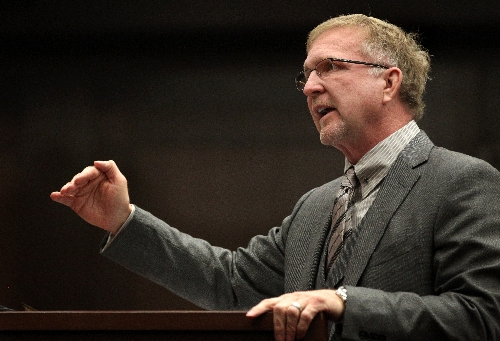High court ruling will establish groundwork for hepatitis outbreak trials
CARSON CITY -- Nurses can do a lot of things, but they can't testify as experts about the cause of a hepatitis C outbreak, an attorney told the Nevada Supreme Court on Monday.
"No appellate court at any level in the United States has ever permitted a nurse to give expert testimony," said Robert Eglet, who won a record verdict last year against two drug companies involved in the 2007 hepatitis outbreak. He also represents several others who contracted the potentially deadly liver disease after undergoing endoscopy procedures at clinics owned by Dr. Dipak Desai.
Monday's hearing revolved around whether a nurse should be allowed to testify as an expert about how the disease spread, whether through misuse of vials of medicine or through dirty instruments.
Attorneys for the drug companies argued that jurors should be allowed to hear about other possible causes of hepatitis C among patients at Desai's clinics.
District judges in Clark County have ruled both ways, so the question ended up before the high court. That has brought the growing number of civil cases against two drug companies to a halt.
The justices, who consolidated two consolidated cases before Monday's hearing, gave no indication of how or when they will rule.
Hundreds of pages of legal documents have been filed with the high court, and every word in those pages boils down to one question: Should jurors be allowed to hear other ways the plaintiffs might have contracted the liver disease?
For defendants Teva Parenteral Medicines and Baxter Healthcare, the issue of how more than 100 patients became ill and tens of thousands potentially exposed is the $500 million question.
That's the amount of damages awarded by jurors in April after they found the two companies were negligent in marketing, selling and distributing multi-use vials of the sedative propofol instead of single-use vials commonly used in minor procedures.
Attorneys for Teva and Baxter filed an appeal last week seeking to overturn the $500 million award.
In pretrail hearings before that trial, District Judge Jessie Walsh ruled on the side of Eglet, who represents 62-year-old private school headmaster Henry Chanin. Eglet argued the law prohibits juries from hearing certain evidence because of the nature of product liability, evidence that implicates Desai and his clinics but doesn't necessarily let the drug companies off the hook.
After all, Eglet argued successfully, company officials had been aware for years that small clinics were misusing the larger vials and continued to market them as a cost saver.
Chanin, whose case was the first of potentially hundreds to go to trial, contracted hepatitis C at one of Desai's clinics during a colonoscopy. The jury awarded him $5 million in general damages and $500 million in special damages, a figure they were told represents two weeks' salary costs for the two companies.
The huge verdict, believed to be the largest in state history, received national attention. In the fall, two other cases were wending their way through pretrial issues when defense attorneys asked their respective judge to allow the jury to hear other theories on how the disease was transmitted.
In one of those cases, District Judge Kathleen Delaney agreed with defense attorneys and ruled she would allow the defense to put on witnesses that would point the finger at Desai and clinic employees.
In the other, District Judge Timothy Williams agreed with Eglet, as Walsh had in April, that evidence in cases alleging product liability be limited to allegations of flaws in the product or its packaging.
There were other problems with Desai's operations outside of the medicine vial issue. Investigators found multiple violations of best practices medical standards regarding how medical equipment is used and disinfected.
In 2008, health officials sent out 50,000 letters to patients who could have been exposed to the virus. Most experts believe Eglet is correct -- that the infection was spread because multiple patients were administered drugs from a vial intended for a single user.
But defense attorneys argue a gross lack of cleanliness spread the disease. Both sides admit nobody can say with certainty how the disease was transmitted, or even to a medical probability of 51 percent.
The Clark County Grand Jury indicted Desai and two nurses on felony counts related to the outbreak, and Desai surrendered his medical license early on. Two doctors recently deemed Desai incompetent to assist in his defense, and a district judge ordered him to undergo a comprehensive evaluation at Lake's Crossing, the state's facility for mentally disordered offenders. A judge has delayed the criminal trial until March 2012.
Desai filed bankruptcy and is not named in the civil lawsuits. Other parties have either been removed from the lawsuit or have settled with the most victims, including doctors who worked for Desai and were linked to infected patients.
The two drug companies are the only remaining defendants.
Contact reporter Doug McMurdo at dmcmurdo@review
journal.com or 702-224-5512.

















